When I was recruiting, I often came across CVs that were packed with information – but not the right kind of information.
Candidates would either miss the essentials or clutter their CV with details that didn’t matter.
The truth is, there are a handful of things every employer actually looks for.
Get those right, and you’ve instantly improved your chances of making it to interview.
Here, I’ll walk you through the 6 features every CV should include if you want to catch a recruiter’s attention and land the jobs you’re aiming for.
What to include in your CV
Here are the 6 most important sections to include in your CV, if you want to maximise your chances of getting noticed.
- Name and contact details – Make your personal details easy for a recruiter to find.
- Professional profile – Quickly summarise yourself and why companies should hire you.
- Core skills – Bullet point your biggest strengths, tailored to the jobs you’re applying for.
- Work experience – Walk through your job history, outlining your duties and accomplishments.
- Education – Note your foundational qualifications that underpin your professional skills.
- Additional information – Further back up your application with further details like hobbies and interests where relevant.
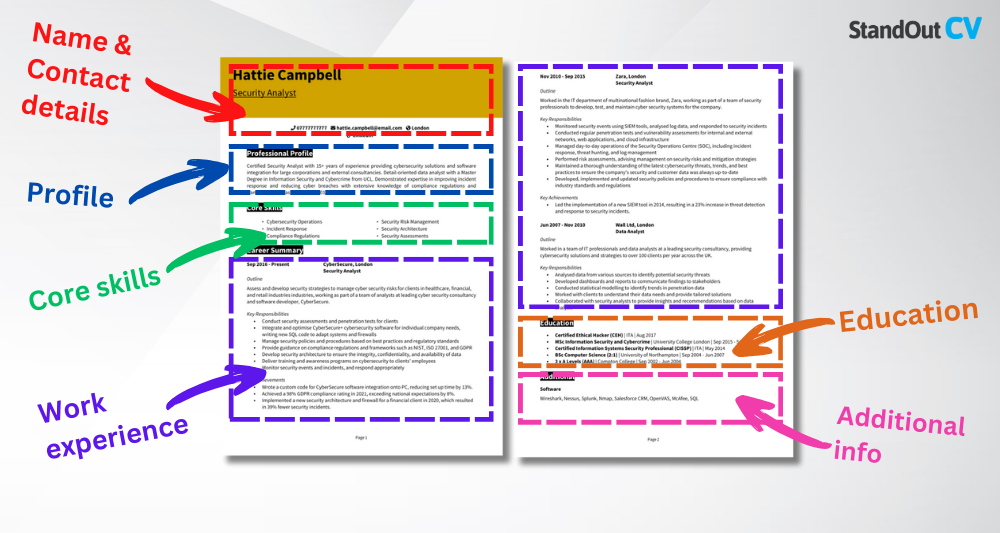

Name and contact details
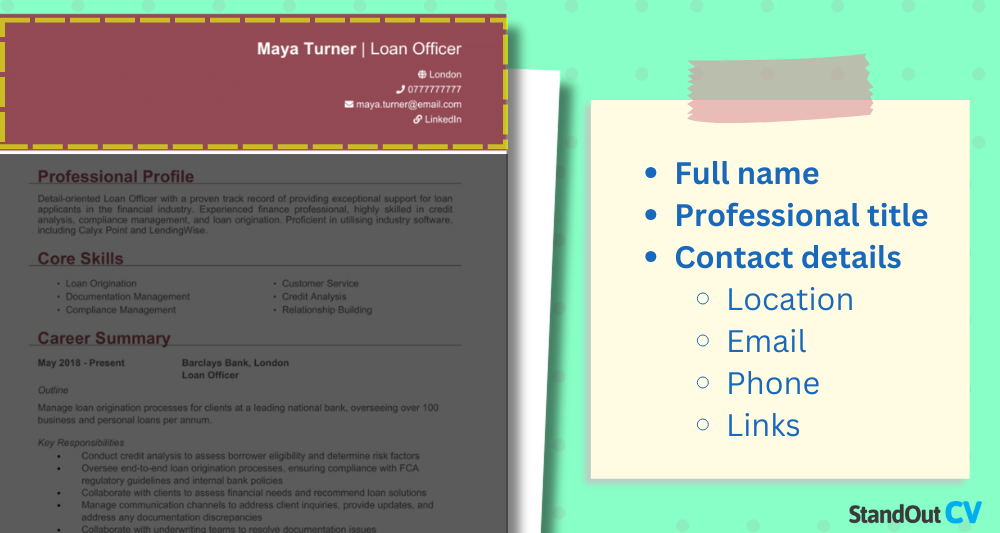
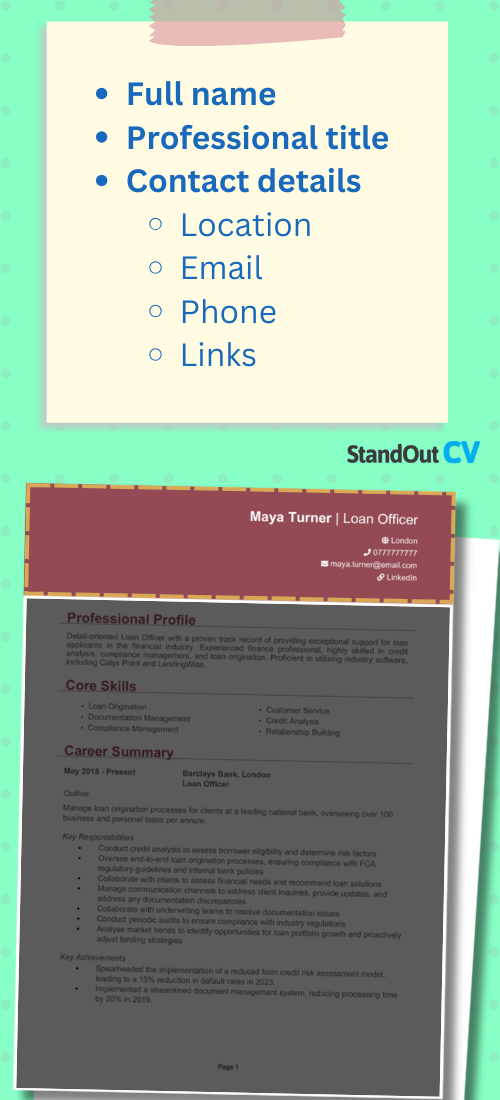
Once prospective employers have been amazed by your CV and are ready to reach out to you, it should be as easy as possible for them to find your contact details.
That’s why they should sit prominently at the top of your CV.
They shouldn’t take away too much space away from your skills and experience, so just include the following:
Essential contact details
- Your full name
- Professional title – Such as “Management Accountant” or “Marketing Graduate”
- Your email address – A professional looking one like “Aaron.smith90@gmail.com” – no nicknames like “funkydiva5000@yahoo.com”
- Your phone number – Mobile is best so that you can answer recruiters’ calls quickly
- Your location, or the area you’re looking to work in – e.g. London or Nottingham
Optionally, you can also add…
- LinkedIn profile – 95% of recruiters use LinkedIn, so you should too – linking your profile would be a good idea.
- Portfolio or website – If you’re going for a role that needs proof of your past projects, a portfolio will be essential.
You don’t need to list private personal details like your:
- Date of birth
- Full home address
- Marital status
These kind of details won’t affect a recruiters’ decision – all they’ll do is take up space, distract from the essentials, and open you up to security risks.
Should you include a photo on your CV? 📸
Photos are never required for jobs in the UK, but they’re increasingly popular in modern CVs. It’s entirely up to you, but they’re a good way to show a bit of personality.
If you do decide to include a picture of yourself, make sure it’s professional: no selfies with your friends, always use a formal headshot.
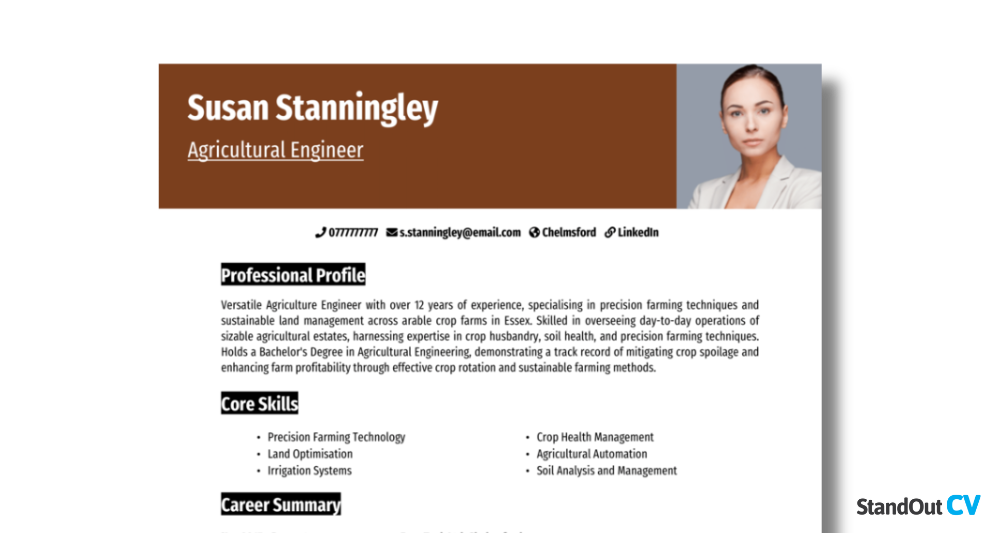
Professional profile


Kick things your CV off with a quick 3-6 line summary that outlines your abilities, your key skills, experience, past achievements, and above all else: the value you’ll bring to any companies that hire you.
This is the first thing recruiters will see when they open up your application, so it’ll need to make an impact. Ideally, it’ll grab a busy recruiter’s attention well enough that it convinces them to read the rest of your CV. Don’t be afraid to brag a little: your CV profile is all about selling yourself.
Your profile should cover the following four essential areas:
- Where you’ve worked – Open with your job title, and state the job and industry you’re presently employed in.
- Your top qualifications – Mention your most significant and relevant qualifications, such as related degrees or relevant certifications.
- Your key skills – Weave in the hard and soft skills that make you the perfect candidate, including your industry-specific knowledge.
- The value you’ll bring – This is the fundamental point of a CV profile: convey what you’re bringing to the table, and the benefits of hiring you over anyone else. e.g. will you increase company sales or help them to improve efficiency?
Professional Profile
Passionate English Teacher with seven years of experience in secondary education, currently teaching at Greenfield Academy, a leading independent school. Holds a BA in English Literature and a PGCE. Skilled in creating engaging lesson plans tailored to diverse learning needs, fostering academic growth, and integrating modern technology. Recognised for delivering a 15% improvement in GCSE pass rates over the past five years and successfully mentored three trainee teachers. Committed to cultivating an inclusive and supportive learning environment.
Check out some more CV profile examples here
If you are a student or school leaver with less formal work experience then you should replace the profile with a personal statement, which goes into greater detail and emphasises transferable skills.
Core skills


Follow up your profile with a concise list of 4-10 of your most important strengths. This will provide recruiters, at a glance, with an overview of the precise skills that will mean you’re able to perform the job effectively.
This section is presented as 2 columns of short, punchy bullet points (ideally no more than 4 words each)
It’s important that the skills you include are tailored nicely to the individual jobs or industries you’re applying for – they’re very easy to just swap out, depending on the role.
Make sure you avoid using clichés and generic soft skills in this section, and instead only add skills that are exclusively relevant to your target jobs.
For example an accountant shouldn’t state “Computing” as a core skill, they should mention “Xero and Quickbooks software“ instead – if they want to look perfect for the job.
Not sure what to include in your CV?
Try our CV builder—it guides you through every section with pre-written content, templates, and expert advice to ensure nothing important is left out.
Work experience


Now that you’ve introduced yourself and your foundational skills, it’s time to get into your job history.
Starting with your latest role, walk recruiters through your previous roles. Your work experience section will need to have plenty of detail for your most recent and relevant jobs, as explained in the layout below.
How to format your jobs

Each of your past roles should follow the same format:
- Outline – State where you work and your place within the company, as well as your overall objective. This bit should quickly set the scene for the following text.
- Responsibilities – Be specific here: using plenty of action verbs, clearly outline your specific duties within the role, weaving in the skills you’re required to apply.
- Achievements – Give a sense of the scope and impact of your role, stating the measurable outcomes of your work. Use numbers wherever possible to make your accomplishments more tangible and memorable. For example:
- “Increased sales revenue by 20% through the implementation of a targeted marketing campaign and upselling strategies.“
- “Reduced project delivery times by 15% through streamlined workflows and enhanced team collaboration.”
- “Achieved a 95% customer satisfaction score by consistently delivering high-quality service and resolving issues promptly.”
What to include in a CV if you have no experience 📄
You might be worried that having little to no experience will result in an empty CV: but don’t worry.
Anything from casual, informal work, to part-time placements, will have equipped you with transferable skills which, presented effectively, will convince recruiters of your potential.
You could include things like:
- Casual or informal work – Part-time jobs, babysitting, or freelancing show responsibility and initiative.
- Volunteering placements – These demonstrate your commitment and teamwork, and your ability to contribute to a cause.
- School or university projects – Highlights skills like research, problem-solving, and collaboration, and an eagerness to learn.
- Extracurricular activities – Leadership roles in things like a club or sport showcase dedication and transferable skills.


Education and qualifications


Your education section is typically small, but it’s nevertheless vital to prove the foundational knowledge that’ll help you excel in your future roles.
Towards the bottom of your CV, add your education section.
Open with your most recent qualifications, and list them in reverse chronological order. You’ll need to state the awarding body, the date you finished, and your grade: but the level of detail you provide will depend on your level of experience.
If you have little or no experience
With less experience, your academic history will need to do more of the heavy lifting. List each qualification like your degrees or GCSEs clearly, providing more detail to the most recent and pertinent.
If you completed any particularly noteworthy and relevant university modules, for example, it would be worth providing a bit of detail on those too.
Education
BA in Management (First) | University College London | Sep 2019 – Jun 2023 | Modules included Organisational Behaviour, Financial Management, and Strategic Leadership. Completed a dissertation on the role of corporate social responsibility in global supply chains, achieving a first.
3x A Levels (AAB) | St John Sixth Form College | Sep 2017 – Jun 2019 | Including Business Studies, Economics, and Further Maths
12x GCSEs (A*-C) | Green Valley Academy | Sep 2015 – Jun 2017 | Including Maths, Science, IT, English
If you have lots of experience
Recruiters tend to place more value on work experience, so if you’ve got plenty under your belt, your education section should remain brief to provide more space for your job history.
Simply list your top qualifications along with the awarding institution, the date you earned it, and your grade (if applicable).
Education
BA in Management (First) | University College London | Sep 2019 – Jun 2023
3x A Levels (AAB) | St John Sixth Form College | Sep 2017 – Jun 2019
12x GCSEs (A*-C) | Green Valley Academy | Sep 2015 – Jun 2017
Additional information


This final section is entirely optional, but provides an opportunity to list any additional details which might underline your suitability for the roles you’re applying for.
Candidates with less experience should consider including plenty of detail here to emphasise transferable skills which prove their potential.
Here are some tips on common things you might write in the additional info section include:
- Hobbies and interests – Especially if they’re highly related to the role, hobbies are a great source of skills and qualities which will help in the workplace.
- Volunteering – This demonstrates commitment, interpersonal skills, and important transferable abilities gained outside of paid work.
- Software proficiencies – If the jobs you want require the use of specialist software, then make sure to mention your knowledge here.
- Languages – Crucial for roles that require multilingualism.
- Side projects – They show motivation and creativity, and your willingness to develop your expertise independently.
- Professional memberships – Memberships to relevant bodies demonstrate your engagement with the industry.
- Awards – They help validate and back up your achievements, and set you apart from other candidates.
What should not be included in your CV
Including unnecessary details will at best take up space from more valuable information, and at worst actively harm your chances. Below are the things that you should never add to your CV.
References
As you’d expect, recruiters look at your CV at a very early stage in the recruitment process: they won’t be needing to contact your referees yet.
Consider that it would also be impolite to circulate somebody’s personal information online, which might potentially be accessed by anyone who receives it.
You should, however, have some references prepared: make sure you ask relevant individuals for their permission and contact details, ready to hand over once you receive job offers.
Unprofessional email address
It might seem obvious, but it’s a common enough mistake that it deserves a mention. Your email address is listed right at the top of your CV, and it’s most likely how recruiters will get in touch, so make sure it’s appropriate.
A professional email address should contain your full name as plainly as possible – if you need to, make a separate address from the one you use in less formal settings.
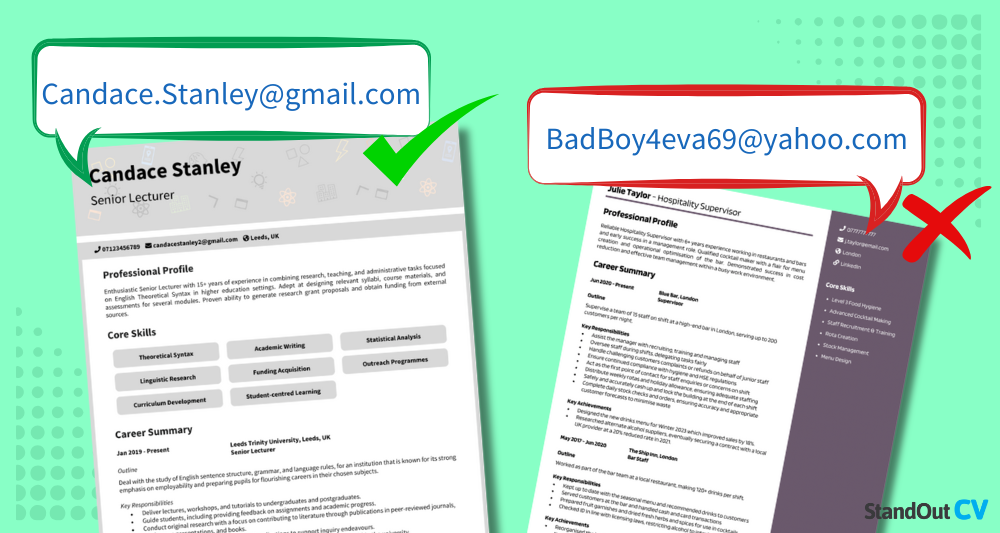
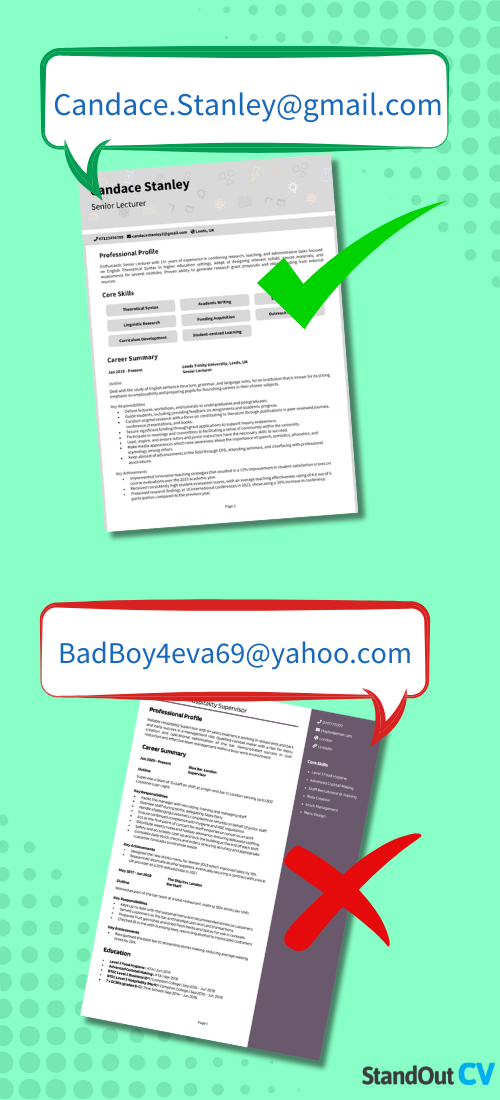
Lies
We’ve all felt the temptation before, and many of us have failed to avoid embellishing past experience.
But getting caught out in a lie on your CV will result in an instant rejection from any recruiter, and will likely burn the bridge with their entire company.
Even if you’re lucky enough to get away with it, you’ll soon find that the job required certain skills for a reason: you’d be entirely out of your depth.
Unexplained gaps
Be honest about any extended gaps between jobs: you should write a brief explanation of the break, whether you were caring for someone or travelling, ideally along with any skills and experience you picked up along the way.
Employers cannot discriminate against you for taking time for physical or mental health conditions, so there’s no need to hide such things.


Excess personal details
Including unnecessary personal information like your date of birth, religion, marital status, and so on, will only serve to detract from the professional focus of your CV.
Such details are irrelevant to your ability to perform at work and, in many cases, may unintentionally invite unconscious bias. Modern CVs focus solely on qualifications, skills, and experience to ensure a fair and merit-based evaluation by recruiters.
Dated work experience
Old work experience, such as junior roles from over a decade ago, is often irrelevant to your current career stage and the role you’re applying for.
Going too far back can make your CV appear overly long and cluttered, diluting the impact of your recent achievements and skills. It also risks exceeding the ideal two page length of a CV.
Unless the experience is directly related to the role or highlights a particularly impressive accomplishment, it’s best to leave it out and focus on showcasing more relevant, recent experience.



